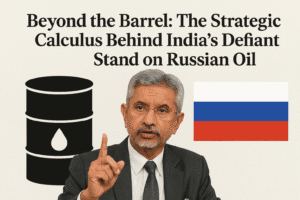Beyond the Barrel: The Strategic Calculus Behind India’s Defiant Stand on Russian Oil
India has firmly defended its increased procurement of discounted Russian oil, rejecting recent U.S. criticism as hypocritical and strategically inconsistent. External Affairs Minister S. Jaishankar argued that India’s actions are driven by national interest and have also helped stabilize global oil markets. He pointed out that the European Union remains the largest importer of Russian liquefied natural gas and that China is the top buyer of Russian crude, making selective accusations against India appear unfair.
Jaishankar emphasized that India will continue to exercise its strategic autonomy in making energy decisions. He also noted that previous U.S. administrations had understood this rationale. The response underscores India’s assertive foreign policy stance and its refusal to be pressured into aligning with Western sanctions that contradict its own economic needs. Ultimately, the position highlights the complex realities of global diplomacy, where strategic partnerships must accommodate divergent national interests.

Beyond the Barrel: The Strategic Calculus Behind India’s Defiant Stand on Russian Oil
When a senior US official recently accused India of running a “profiteering scheme” by buying discounted Russian oil, it wasn’t just a diplomatic jab; it was a challenge to a fundamental pillar of India’s foreign policy. The response from External Affairs Minister S. Jaishankar was not one of diplomatic platitudes but of sharp, uncompromising realpolitik: “If you have a problem… don’t buy it.”
This exchange is more than a war of words. It reveals a deep and calculated strategy by India, one that balances national interest, global stability, and a fierce commitment to strategic autonomy in a fractured world.
The Core of the Contention
The facts are straightforward. Following the war in Ukraine and subsequent Western sanctions, Russia began offering its crude oil at a significant discount. India, which imports over 80% of its oil needs, seized the opportunity. Its imports of Russian crude skyrocketed from a negligible 1.7% of its total before the conflict to over 35% today, making Russia its top supplier.
The US criticism, led by Trade Adviser Peter Navarro, hinges on the idea that India is refining this cheap Russian oil and selling the finished products at a premium on the global market, thereby undermining the economic pressure the West seeks to place on Moscow.
Jaishankar’s Rebuttal: A Masterclass in Realpolitik
Jaishankar’s response dismantled this argument point by point, framing India’s actions not as profiteering, but as responsible statecraft.
- The “Pro-Business” Irony: He immediately highlighted the contradiction of a “pro-business American administration” criticizing another country for seeking a good deal. This reframes the issue from a moral failing to a simple, and universally accepted, business practice.
- The Hypocrisy of Selective Targeting: Perhaps his most potent argument was one of consistency. He pointed out that the largest importer of Russian crude is China, and the largest importer of Russian liquefied natural gas (LNG) is the European Union. By focusing criticism on India while larger players continue their trade, the West appears to be applying a selective and unfair standard.
- The “Funding the War” Fallacy: To the charge that India is funding President Putin’s war effort, Jaishankar presented a stark numbers game: EU-Russia trade is significantly larger than India-Russia trade. If the goal is to cut off revenue to Moscow, the logical focus should be on the largest financial flows, not the smaller ones.
- Stabilizing, Not Destabilizing: India’s most compelling, and often overlooked, argument is that its purchases have actually served a global good. In 2022, as oil prices threatened to spiral out of control, increased supply from India—fueled by Russian discounts—helped calm volatile global markets. What is in India’s “national interest” also served the “global interest” by preventing even more severe economic pain worldwide.
The Bedrock Principle: Strategic Autonomy
At its heart, this is not a debate about oil, but about sovereignty. For India, the term “strategic autonomy” is not a buzzword; it is the non-negotiable core of its foreign policy. It means the freedom to make decisions based solely on its own national interest, free from coercion by any major power bloc.
Jaishankar explicitly stated that previous US administrations understood and even tacitly accepted this logic, recognizing that India’s actions were stabilizing the market. The current criticism, therefore, represents a shift in tone that New Delhi finds both curious and unacceptable.
The Bigger Picture: A Multipolar World in Action
India’s defiant stance is a clear signal of the new world order taking shape. Middle powers like India are no longer willing to automatically align with the dictates of traditional Western powers. They will leverage their geopolitical weight to secure favorable terms and pursue independent paths.
This creates a complex challenge for the West. It needs partners like India to counterbalance China, but it must also accept that these partners will not always fall in line with every sanctions regime or foreign policy objective. Navigating this tension—between demanding allegiance and respecting autonomy—will be a defining task of 21st-century diplomacy.
The Final Analysis
Labeling India‘s actions as mere “profiteering” is a simplistic misreading of a sophisticated strategy. India is playing a weak hand masterfully. It is securing its energy security, bolstering its economy, and asserting its right to independent action—all while providing a commodity that keeps the global economy running.
The message from New Delhi is clear: in an unstable world, every nation must look after its own interests first. And if that means buying discounted oil to power the growth of a billion people, then that is exactly what a responsible government will do. The West can choose to criticize, but as Jaishankar made plain, it cannot claim the moral high ground while its own allies continue the very same trade.
You must be logged in to post a comment.